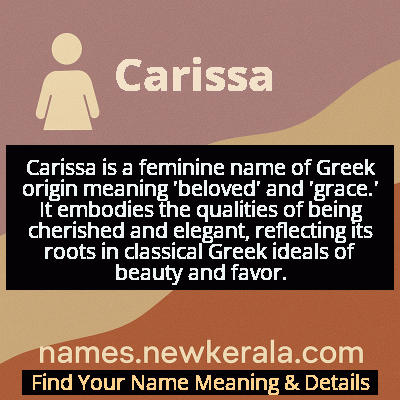Carissa Name Meaning & Details
Origin, Popularity, Numerology Analysis & Name Meaning of Carissa
Discover the origin, meaning, and cultural significance of the name CARISSA. Delve into its historical roots and explore the lasting impact it has had on communities and traditions.
Name
Carissa
Gender
Female
Origin
Greek
Lucky Number
7
Meaning of the Name - Carissa
Carissa is a feminine name of Greek origin meaning 'beloved' and 'grace.' It embodies the qualities of being cherished and elegant, reflecting its roots in classical Greek ideals of beauty and favor.
Carissa - Complete Numerology Analysis
Your Numerology Number
Based on Pythagorean Numerology System
Ruling Planet
Neptune (Ketu)
Positive Nature
Intuitive, analytical, spiritual, and inquisitive.
Negative Traits
Secretive, reserved, aloof, and can be overly critical.
Lucky Colours
Green, yellow.
Lucky Days
Monday.
Lucky Stones
Cat’s eye, moonstone.
Harmony Numbers
1, 5, 6.
Best Suited Professions
Scientists, researchers, spiritual leaders, detectives.
What People Like About You
Depth of knowledge, analytical skills, spirituality.
Famous People Named Carissa
Carissa Moore
Professional Surfer
Five-time World Surf League Champion and Olympic gold medalist
Carissa Pinkston
Actress
Known for roles in 'The Bold and the Beautiful' and various film productions
Carissa Byrne
Legal Scholar
Noted constitutional law expert and professor at Stanford Law School
Carissa Walford
Television Personality
Star of reality TV series 'Blood, Sweat and Heels' and fashion entrepreneur
Name Variations & International Equivalents
Click on blue names to explore their detailed meanings. Gray names with will be available soon.
Cultural & Historical Significance
In modern contexts, Carissa represents a bridge between classical education and contemporary values, often selected by parents with an appreciation for Greek heritage or classical literature. The name's continued usage across generations demonstrates its timeless appeal and adaptability to different cultural moments while preserving its essential meaning. Unlike many ancient names that fell out of use, Carissa managed to maintain relevance by balancing traditional elegance with modern accessibility, making it a choice that honors heritage without feeling outdated or overly formal.
Extended Personality Analysis
Women named Carissa are typically characterized by their graceful demeanor and emotional intelligence. They possess a natural charm that makes them approachable and well-liked, combined with strong intuitive abilities that allow them to understand and empathize with others deeply. Carissas often excel in social situations due to their diplomatic nature and ability to create harmony in groups. They tend to be creative individuals with a strong appreciation for aesthetics, whether in art, nature, or human relationships. Their combination of sensitivity and strength makes them both compassionate friends and resilient problem-solvers.
Beyond their social grace, Carissas often demonstrate remarkable inner strength and determination. While they may appear gentle and accommodating, they typically possess a strong sense of personal values and the courage to stand by them. This balance of softness and strength allows them to navigate challenges with poise and effectiveness. Many Carissas are natural caregivers and peacemakers, often finding themselves in roles where they can support and uplift others. Their name's meaning of 'beloved' often manifests in their lives through deep, meaningful relationships and their ability to make others feel valued and appreciated.
Modern Usage & Popularity
In contemporary naming practices, Carissa maintains a stable presence as a classic yet distinctive choice for baby girls. While it reached its peak popularity in the late 20th century, the name has settled into a comfortable position where it remains recognizable without being overly common. Current usage trends show Carissa appealing particularly to parents seeking names with Greek origins that offer both elegance and strength. The name enjoys moderate popularity across English-speaking countries, with consistent usage in the United States, Canada, Australia, and the United Kingdom. Its appeal lies in its balance of traditional roots and modern sensibility, making it suitable for various cultural backgrounds while maintaining its Greek heritage. Recent years have seen a slight increase in usage as parents move away from ultra-popular names toward more distinctive classical options.
Symbolic & Spiritual Meanings
Symbolically, Carissa embodies the concept of grace in its fullest sense - encompassing physical elegance, spiritual beauty, and emotional generosity. The name represents the ideal of moving through life with poise and compassion while maintaining inner strength and resilience. Metaphorically, Carissa suggests a person who brings harmony and beauty to their surroundings, much like the Greek Graces who inspired the name. It symbolizes the ability to balance strength with gentleness, independence with connection, and tradition with modernity. The name also carries connotations of being cherished and valued, representing both the capacity to love deeply and to be loved in return. In broader symbolic terms, Carissa represents the enduring power of classical virtues in contemporary life, serving as a reminder that grace, beauty, and belovedness remain relevant and aspirational qualities across generations and cultures.

